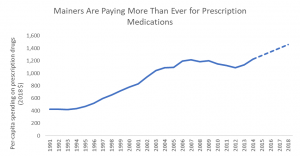The right of workers to organize and bargain with their employer benefits all Mainers. Collective bargaining leads to better wages, safer workplaces, and a fairer and more robust economy for everyone — not just union members. The right to strike is critical to collective organizing and bargaining. Without it, Maine’s public employees are unable to negotiate on a level playing field.
Maine’s Legislature is considering a bill that would give public-sector workers the right to strike. MECEP supports the legislation, and is urging legislators to enact it.
The right to strike would enable fairer negotiations between public workers and the government. All of us have reason to support that outcome. Research shows that union negotiations set the bar for working conditions with other employers. And as the largest employer in Maine, the state’s treatment of its workers has a big impact on working conditions in the private sector.
Unions support a fairer economy. Periods of high union membership are associated with lower levels of income inequality, both nationally and in Maine. Strong unions, including public-sector unions, have a critical role to play in rebuilding a strong middle class.

Unions help combat inequities within work places. Women and people of color in unions face less wage discrimination than those in nonunion workplaces. On average, wages for nonunionized white women in Maine are 18 percent less than of those of white men. Among unionized workers, that inequality shrinks to just 9 percent. Similarly, women of color earn 26 percent less than men in nonunionized jobs; for unionized women of color, the wage gap shrinks to 17 percent.[i]
All of us have a stake in the success of collective bargaining. But a union without the right to strike loses much of its negotiating power. The right to withdraw your labor is the foundation of collective worker action. When state employees or teachers are sitting across the negotiating table from their employers, how much leverage do they really have when they can be made to work without a contract? It’s like negotiating the price of a car when the salesman knows you’re going to have to buy it — whatever the final price is.
Research confirms that public-sector unions are less effective without the right to strike. Public employees with a right to strike earn between 2 percent and 5 percent more than those without it.[ii] While that’s a meaningful increase for those workers, it also should assuage any fears that a right to strike would lead to excessive pay increases or employees abusing their new right.
LD 900, “An Act to Expand the Rights of Public Employees Under the Maine Labor Laws,” ensures that Maine’s public-sector workers will have the same collective bargaining rights as other employees in Maine. The bill would strengthen the ability of Maine’s public-sector workers to negotiate, resulting in higher wagers, a more level playing field, and a fairer economy for all of us.
Notes
[i] MECEP analysis of US Census Bureau, Current Population Survey, Outgoing Rotation Group data, 1998-2017 via the Integrated Public Use Microdata System.
[ii] Jeffrey Keefe, “Laws Enabling Public-Sector Collective Bargaining Have Not Led to Excessive Public-Sector Pay,” Economic Policy Institute, Oct 16, 2015. Web. Available at https://www.epi.org/publication/laws-enabling-public-sector-collective-bargaining-have-not-led-to-excessive-public-sector-pay/



